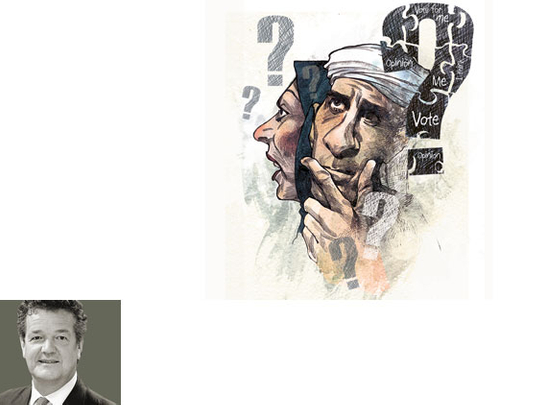
The National Election Committee has announced a huge increase from 6,600 in 2006 to 129,000 this year in the numbers of voters for the elections this September for half of the seats in the Federal National Council (FNC) that are chosen by voting (the other half are appointed members). The next FNC will face a serious task as it redefines its role and takes on more responsibility, so it is important that the new members of the FNC are the best that the UAE can find.
There was startling response to the announcement of the 129,274 names on the electoral role for this September, with many younger Emiratis expressing their ignorance of what was required of them as voters, and widespread unawareness of the role of the FNC. A regular reader of the UAE's media would find this surprising, since the doings of the FNC are well-publicised, but what is clear is that many do not follow the UAE's media.
But there is a deeper reason because this type of popular inclusion in the process of government is still largely untested in the UAE. Emiratis may be broadly happy with the government's performance, but they still think of government as something that ‘they' do, rather than making it a personal responsibility to be involved and take an interest. There is a very large task ahead in educating the Emirati public, and building a responsible and aware electorate.
This cannot happen in the next few weeks, and it has to be something that will be built up over time. The experience of voting in one election should be carried forward to the next, and the next and the next, so that the individual voters gather knowledge about how to make a successful choice, and see the candidates they supported perform. The country has to yet build that vital link between the voters' future support and the FNC members' performance.
In any election there are some essential elements. To achieve the best result, the electorate has to be well-informed about the policies and attitudes of the candidates. Only then can the electorate make an informed choice. This requires that candidates for office have the time to publicise their views, which is hard in the UAE's case since campaigning will take place between September 4-21.
Less than three weeks is not a lot of time for the expected hundreds of candidates to distinguish themselves from their rivals, particularly since they will only know for certain that they will be candidates when the final list is published on August 28.
In addition to having enough time to reach the public, there also has to be recognised means by which this communication happens. In most countries this happens through the media, and candidates take part in TV debates, are interviewed in the newspapers, and drop into radio chat shows. Given the present interest in social media, it is certain that any candidate who wants to connect with much of the electorate audience in the UAE will need to launch his or her Facebook and Twitter accounts.
Political parties
It is also hard on the candidates that they are all functioning as individuals. The UAE's elections do not have associations or political parties, which would allow an average candidate to align him or herself with an established set of suggested policies. In more established democracies, it is very important to offer the electorate a well chosen manifesto of policies that the candidates agree are important for their country.
Although a major disadvantage of a party system is that the merits (and demerits) of any individual candidate get hidden by the overall appeal of the party as a whole, the benefits are that the electorate's choice is made easier by having a clear set of options.
The challenge in the UAE this September will be to find out what each candidate wants and how they suggest that their proposed policies can happen. The political clutter of having several hundred individuals all talking at once, will give the UAE's first large electorate a particularly difficult task in choosing the best candidates.
However, these difficulties are there to be dealt with. The government from the highest levels down has frequently said over the past few years that the UAE needs "to enrich and develop our parliamentary experience", as said by President His Highness Shaikh Khalifa Bin Zayed Al Nahyan, upon the election of the previous FNC in 2006.
It is also important that the UAE started the process of building popular inclusion in government several years ago. The turmoil in the region this year, following the revolutions in several Arab states, has given the process of political development in any Arab state a particular topicality, but the gradualist approach adopted by the UAE to its own political development was mapped out long before the Arab Spring.
It may not be fast enough or transparent enough for some, but at least it is under way. The real challenge will be to get the best members possible into the next FNC, so that it can meet the high expectations which will be made of it.












